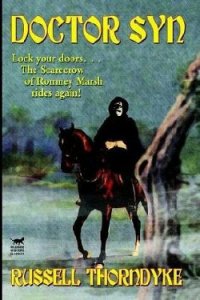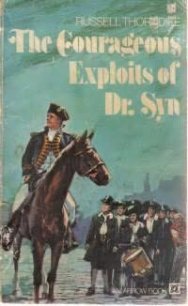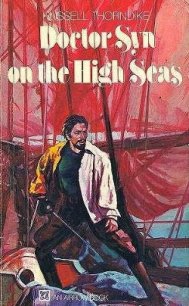The Shadow of Dr Syn - Thorndike Russell (библиотека электронных книг txt) 📗
1 Mournful.
2 Critical.
3 Tither about, to waste time, to dawdle.
36 round to the “Ship” and soon get charted up on him.’ But he took care not to mention that he had already slipped there and gained several drinks from the gentleman in question.
‘You need not trouble, Mr. Mipps. I have him spotted. Well, what else? Nothing to report from the Court House?’
‘Coo — I should say there be and well you knows it. The ’ullabelaybaloo started as soon as you’d gone. I ’ave ’ad Sir Antony round ’ere every day with his face as long as a yardarm askin’ for you. Got tired o’ sayin’ you’d gone preachin’ in London. He finally writes a note which he says I’m to give you the first minute you gets back.’
‘Well, I’ve been here more than a minute, Mr. Mipps.’
‘That’s right. So you ’as and ’ere it is.’ And from the desk, Mipps handed Doctor Syn a letter which read as follows:
Nov. 12th, 1794
The Court House,
Dymchurch-under-the-Wall,
Kent.
My Dear Christopher,
Not knowing your whereabouts in London I have been pestering the good Mipps for knowledge of your return. Will you send word of your arrival, for I find myself in need of your counsel. In fact, my dear Christopher, I am confoundedly worried, the reason being that Cicely, ever wayward, has vanished into thin air. She rode off saying that she had a mind to visit the Pemburys at Lympne, but we now find that she never went there, and not a sign have we had from the naughty miss since. Caroline is in a pretty pet as her Aunt Agatha is due here for a visit, and she wanted our girl to make a good impression. I know you cannot fully appreciate the trials and tribulations of a family man, nor understand my mortification when Caroline looks at me as though it were my fault. So do be a good fellow and come and help me out. Yours affect.,
Tony.
Which appeal from an obviously harassed paterfamilias caused the Vicar no astonishment. He almost appeared to have been expecting it. Nor did he show the least surprise on hearing outside the window footsteps crunching the shingle and someone whistling quietly the opening bars of ‘The British Grenadiers’.
Chapter 5
Mr. Bone Whistles the Same Tune
Mr. Bone stepped into the Vicarage and greeted Doctor Syn with the easy familiarity of an old friend. He was invited to divest himself of his riding-coat and partake of the best brandy in Dymchurch, which he did with obvious appreciation, standing with his back to the fire while the Vicar sat comfortably in the corner of the settle. The brightly burning logs and the candles in their sconces over the mantelpiece reflected upon the lofty moulded ceiling the shadow of the highwayman, whose giant frame dwarfed the hovering Mipps as he tithered about the room, filling churchwardens from the generous pot of Virginian tobacco, and keeping the glasses, his own included, up to the brim. His inquisitive nose and the quivering tarred queue behind that balanced it made him look more foxy than ever as he chuckled with delight at Doctor Syn’s account of the journey by coach, of Foulkes’s discomfiture, and the bravery of the little old lady with quaint manner and an even quainter dog; which same old lady in the Cobtrees’ best spare bedroom was now, with the help of Lisette, changing into evening finery. If the gentlemen at the Vicarage considered her manner quaint, they might have considered her language to be more so when she was reminded by her empty jewel-case that Gentleman James had not left her a single bauble. In fact she rated him so fiercely that had Gentleman James but heard her he might have considered her no lady. The old lady was well-nigh forced to borrow her dog’s bracelets. How surprised she would have been then had she known that at that very moment the fate of her missing jewelry was being discussed by none other than the learned pleasant gentleman with whom she had travelled and the robber himself, and this but a stone’s-throw away at the Vicarage.
‘I am extremely sorry, my dear Jimmie,’ Doctor Syn was saying, ‘but I had no idea that the old lady would be travelling by that coach. May I suggest, since the Cobtrees are such friends of ours’ (at which Mr. Bone grimaced appreciatively, thinking of the many broadsheets Sir Antony had put out against him), ‘that we have a little private transaction. You being as good a valuer as any of the Receivers, what do you estimate they are worth to you?’
Mr. Bone threw back his head and pulled at his ear as he made rapid mental calculations, but upon realising the full significance of what the Vicar had in mind, brought it sharply back again with a quick retort. ‘Oh no, you don’t,’ he cried. ‘If you’re thinking of buying back the old Scotch lassie’s jewellery and are a-thinking that I’d let you do it, then my name’s not Gentleman James. I liked her so well that I came here tonight with the lot in my pocket, so will you kindly do me the honour of getting them back to her with my compliments? I should like to have done it myself, but my presence at the Court House might have embarrassed the Squire.’ At which statement Mr. Bone smiled somewhat ruefully, thinking that perhaps after all the life of a gentleman of the road was rather a lonely one. Doctor Syn thanked him warmly, knowing it was hopeless to argue further against his friend’s generosity. ‘Besides,’ went on Jimmie Bone, ‘I shall have made a tidy profit on the effects I lifted from that swaggering Bully.’
‘Upon which,’ put in Doctor Syn quickly, ‘I shall refuse to take my tithes.’ And they both laughed heartily.
But the Highwayman’s voice took on a more serious note as he asked, ‘What do you intend to do with the blackguard, since you told me of his wager to catch the Scarecrow? The blustering fool. As if he had a hope in hell. Would you like me to deal with him?’
‘Time enough to think of that, my dear James,’ replied the Vicar, ‘but there is something I would like. A glace through the papers in his wallet.’
‘Easy enough,’ said Gentleman Jim. ‘’Tis intact save for the paper money which I changed into gold before it could be traced.’
‘A wise precaution,’ laughed the Vicar. ‘’You’re incorrigible, Jimmie. For here I find myself aiding and abetting when I should be showing you the errors of your ways.’ Saying this as he went through the wallet quickly, and finding the paper he required, handed it to Mr. Bone for his enlightenment.
‘An I O U for a thousand pounds, eh? From my Lord Cullingford. Is your reverence about to aid and abet some other arrogant fool?’
Doctor Syn shook his head. ‘No, I intend to show that misguided fool the error of his ways and make him mend them.’
‘And I have no doubts but you will do it good and proper, and by the time you’ve finished with him he’ll be glad to follow the straight and narrow path.’ Mr. Bone, glancing at the wallet which the Vicar had returned, remarked: ‘’Tis so full of other I O Us that he’ll not miss a paltry thousand. And since you’re about to help this wayward youngster, I’ll follow your example and relieve the others,’ and he threw a fistful of scribbled slips into the fire.
Thus dismissing the subject of the coach and its occupants they fell to discussing more serious matters, plotting the manner of the ‘runs’ for the following week, and the false ‘runs’ that should precede them, to throw Major Faunce and his Dragoons on a false scent.
Mr. Mipps, having cleared the refectory table, unrolled a large survey map of Romney Marsh, pinning it flat for easy perusal. Over this they stood, while Syn’s long, pointed finger moved this way and that, as he unfolded his plan of campaign and fully explained his tactics. Indeed they looked for all the world like generals setting their plan of action before a major battle, while Mr. Mipps, as fussy over details as any aide-de-camp, followed the series of actions, making copious notes and rough diagrams in his undertaker’s notebook. Thus they worked for an hour or so poring over maps, listing movements of the ships and cargoes, settling the number of pack-ponies required, and discussing the merits of local horses necessary for the night-riders. Not that the Scarecrow depended upon the contents of his followers’ stables. Far from it. He had imposed a custom that had become almost a law, for by the ingenious method of various chalk-marks upon stable doors, the ostlers, who for the most part were in the game, saw to it that the doors were left ajar. Indeed, many a fine gentleman, even the Squire himself, spoiling for a good day’s sport following hounds, had, much to his chagrin, found himself mounted upon a tired and jaded animal, who, by reason of its equine inability to gossip, was unable to inform its spurring master of the questionable activities it had been forced into all night.




